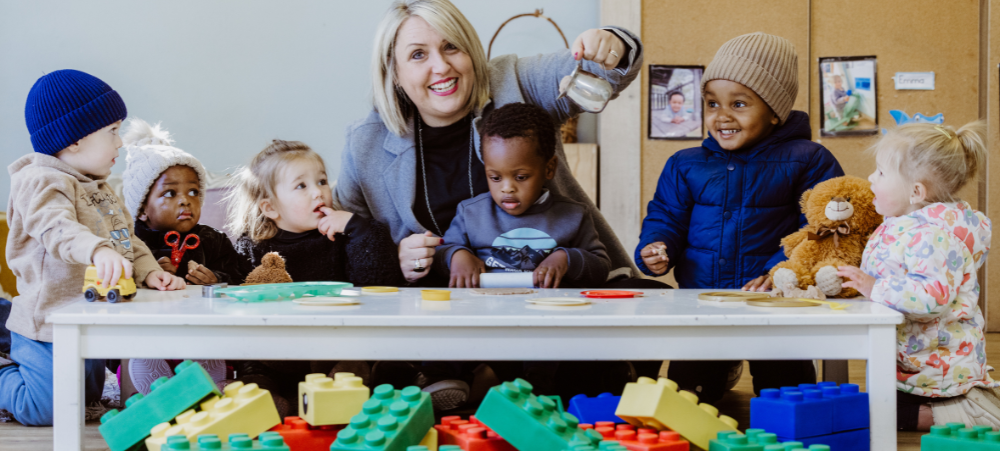Teachers have a unique and important responsibility in children’s lives. They help to shape a child’s experience and understanding of the world and how to learn and live in it. This is especially true of preschool teachers – a preschool teacher is one of the earliest role models in a child’s life.
Preschool teachers can help to set children up for a successful school career, and even for life beyond that. Dr Jenny Wright, Pre- and Primary School Curriculum Head at Curro Holdings says that preschool teachers can have a profound influence on how a child engages with learning.
This means it is very important for parents to understand the role that their child’s preschool teacher will play and the psychological element of a good “match”.
A foundation for positive learning

Preschool teachers often provide a child with their first experience of formal learning and establish their sense of security, trust and willingness to learn at school. “A positive relationship sets the stage for a supportive learning environment, where children feel encouraged to explore, grow and thrive,” says Dr Wright.
The benefits of a strong teacher-child relationship are transformative. Children who experience positive relationships with their teachers tend to have improved social and emotional development, increased academic achievement, enhanced self-esteem, better behaviour and stronger communication skills.
Signs of a positive relationship between a child and their teacher
“A positive experience can foster a love for learning, while a negative experience can lead to difficulties in future academic settings. As teachers, we have a responsibility to ensure that every child feels seen, heard, safe and supported from the very beginning,” says Bianca Moses, Preschool Head at St Dominics, Newcastle.
If a child is happy and excited to come to school, parents can feel assured that their child feels comfortable to be there and this is evidence of a warm and caring teacher-child relationship, says Dr Wright.
“I recommend that parents observe teacher interactions during a school tour and ask about teacher training and qualifications. It’s also important that parents know what type of curriculum the school offers and what they value in early education. Looking at the classroom environment will also give them an indication of the care that is shown by the teacher,” she adds.
How teachers foster a positive relationship

Teachers can build strong relationships by engaging in play, using positive communication, and offering individualised support. Activities like circle time, storytelling, small group work and one-on-one time also help foster connections. By prioritising relationship-building, teachers create a supportive learning environment.
Murrae Rypstra, an early childhood development practitioner at Curro Aurora says that there are several things that a teacher can do to cultivate this type of relationship with their learners. “Show genuine interest in the child and what they are doing or saying. Offer lots of positive reinforcement and praise. Always show empathy and let the children feel validated when they are sharing big emotions,” she says.
When to be concerned
Dr Wright says that a parent should be concerned if their child is continually unhappy about going to school and the teacher is not showing any interest in helping the child settle and enjoy or be excited about school.
Non-verbal cues will be important, especially with younger children. Other signs that a child may not be fond of their teacher include:
- Complaints or negative comments about the teacher.
- Changes in behaviour or moods, such as becoming more withdrawn or aggressive.
- Lack of enthusiasm for school activities or projects.
- Parent-teacher communication is lacking or unsatisfactory.
It is important to note that every child is unique, and the bonding process will depend on a child’s personality, the teacher’s approach, and the quality of interactions. It can take anywhere from a few weeks to a few months for a child to develop a bond with their preschool teacher. However, when a child has a genuine connection with their teacher, it can have a positive impact on them for the rest of their lives.
Curro strives to contribute towards the sustainable growth of South Africa and beyond,
by widening access to quality schooling across a spectrum of education approaches. These include Curro, Curro Academy, Meridian, Select schools, DigiEd, National Certificate
Vocational education facilities, assisted learning facilities, as well as a digital learning
approach.
Curro Holdings provides an ethical, values-based environment, and offers a learner-centric, balanced, innovative and relevant curriculum across the various schools.
- Choosing a school with a strong approach to reading - November 26, 2024
- The importance of the child-teacher relationship at preschool level - October 3, 2024
- Unplugged coding in early childhood: Equipping your preschooler to succeed in the digital world - September 9, 2024





